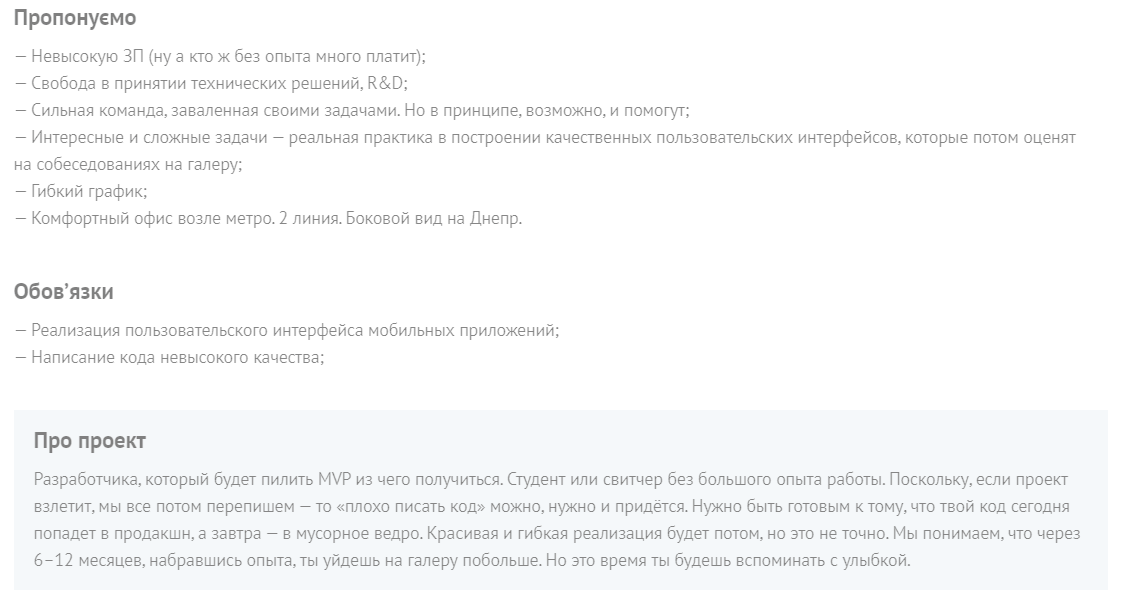
In our company, the phenomenon of the switcher is very common – people who have radically changed their professions and lives. Their stories are inspiring, so we decided to share their experiences since we think they can be useful to those who are considering changing their lives and want to become a part of the IT world.
We have launched a new section on our blog called “HUSPI Success Stories.” The first story is about Vadim, our Frontend Developer, whose long journey to IT started… at a pedagogical college and McDonald’s.
Education
The story begins with the Rzhyshchiv Industrial and Pedagogical Vocational College.
“Like most guys, I loved to play computer games and my imagination worked well in that direction,” Vadim laughs. “I’m from Bila Tserkva originally, I never was an A-student, but I still wanted to get into the university. Therefore, I went to college first and this allowed me to get to the third year of NUBIP University for software engineering.” Yay for software engineering, but of course, this wasn’t the dream come true yet. However, this was the beginning of a long and difficult journey to becoming a developer.
“I always wanted to become a programmer. I was fascinated even by the idea of writing software with my own hands and this software can be useful to someone. Perhaps, this was why it seemed so complicated and unreal because I couldn’t believe that I could do that. It was somewhere at the same level as rocket science at the time.”
“My university gave me a great theoretical foundation, but as is often the case with students, it wasn’t easy to find a job in my specialty right after university graduation. Most employers are looking for experience because it’s practical skills that have market value. Well, that wasn’t going to stop me from trying.”
First Job
“Of course, not being able to find a job in the software development field right away wasn’t a dead end and I just needed to keep learning.” To afford to study, Vadim needed to find a temporary job, so that summer, after graduating from university with a bachelor’s degree in software engineering, he found himself in the Mcdonald’s backend – on the other side of the cash registers.
“Just like everyone else in McD’s, I began as a regular worker,” says Vadim, “and later I advanced to be an instructor, teaching newer employees what I have already learned.”
Vadim didn’t plan on staying at McDonald’s for too long, but that summer job became his place of work for over two years. Despite that, the dream of becoming a software engineer kept getting stronger.
“A dream is a dream, so while I was working full-time at McDonald’s, I was also constantly studying and reading up on every book and resource related to software development. I liked my job at McDonald’s, but I didn’t see myself in the restaurant business. I knew that I was valued there, and I liked that I could see the results of my work right away. I was very good at it and I even got the “Best Employee of the Month” award!”
“However, the euphoria started to disappear about a year into my McD’s adventure and I once again dived deep into programming. I would spend several hours almost every day after work trying to create software. As I progressed, programming started taking more and more time and I started even taking time off at McDonald’s to write some more code. That was my second year at McD’s.”
Thirst for change
April came and Vadim was on vacation. “I have decided that it’s time for me to look for a job that fits my university degree. It took a while for me to understand what I would like to begin with and thought that working with HTML might be a good starting point. I thought it wouldn’t be a high-responsibility job and would fit a beginner.”
Fate had a different opinion and Vadim failed 10 job interviews. However, he wasn’t a person to give up a dream, so he kept on trying.
“I started sorting through the vacancies with the desktop applications’ stack that I was mostly interested in and saw that there are requests for Middle and Senior positions, but nothing was open for a Junior. I saw only one vacancy for a Junior position in Terrasoft, but the tech stack was so complicated for me at that time it was unrealistic for me. That was a turning point for me because I realized that, although I have spent the last three years on desktop technologies, I needed to change the stack.”
“It was a difficult decision to make. The previous knowledge gave me a good foundation, but at the same time, it meant that I needed to start learning new frameworks, so once again I went back to the learning board.”
I decided to go to the software development courses because I expected that the information there would be more structured with clearly defined stages and classification – something that I couldn’t find on the Internet. However, honestly, those courses didn’t help me much. The only thing that I learned from there was the block where they talked about React. The teacher there was a Senior developer who worked on creating commercial projects.
As time went on, I decided to try my hand at the Frontend position. “I like it more, so perhaps, this will work out better than my previous attempts. As it turned out, I was right.”
“Don’t be afraid to write shitty code… At first.”
“As I started to look for available Frontend vacancies on DOU, I stumbled across one that caught my attention – not the job description itself, but the way it was phrased: “Don’t be afraid to write shitty code – once you learn to write good code, we’ll sit down with you and laugh together about your first attempts.”

This vacancy created an emotional connection that intrigued me. I decided that it was worth a try and sent my CV. In reply, I got a simple test task – write a calendar app – and a good luck wish.

I got very excited about that task and really wanted to do it well. I never did anything interactive before, so this project was a personal challenge and experience for me. This also was an introduction to Redux and React. I was working on this project for a week and since I was in the process of leaving McD’s work at the time already, I could devote all my free time to this calendar. I even gave up seeing my friends that week. My friends didn’t appreciate my inspiration, but I didn’t really care at that point. I wanted to create this little project even just for myself. I remember it even now – the deadline was on Monday and I was sure this time: I will get this job because I liked what I have developed myself.
And I was right! I got the invitation to come to the office for a job interview.

I immediately appreciated the approaches of HUSPI – no excessive bureaucracy or unnecessary rules – and I still remember that interview warmly. According to my own assessment, I passed the interview by about 70-80%. I had six questions and one of them was to write a simple code and another was a question about the test task. And to my excitement, my future team lead praised my code for correct structuring.
Another week later I received a letter that HUSPI wanted me to become a part of their team and my dream came true!
Dream Job
The switch to the new job was easy. The first two weeks were spent studying and then I received my first project. By now I have large projects and I know the areas I would like to enhance and grow in.
Yes, software development isn’t always easy. Once every 3-5 years, we need to relearn because the technology doesn’t stand still, but I’m ready for it. And I don’t consider my work a “job” because it’s what I love to do and I get paid for doing what I love.
Vadim Recommends:
Books:
- The book “CLR via C#. Programming on the Microsoft.NET Framework” – A difficult book, but there are well-described paradigms and patterns, and well explained the essence of programming using C#.
Resources:
- https://metanit.com/
- https://learn.javascript.ru/ – it’s like a roadmap that you go along with and the parts you don’t understand, you google.
- https://ru.reactjs.org/
Advice:
- If you start doing something, choose one direction and one book on the subject that you would like to study. That will be enough to start because you don’t need to spend time on a hundred different classes and literature available online. It’s better to learn the foundations and then consolidate the theory in practice, even if it will be a small project – like a calculator or a calendar.
When the project grows in size, it should not become complicated – the structure of the project should be such that any of the developers could understand it in half an hour.
Vadim V.
To see relevant open positions for HUSPI, see our DOU profile.
To see a great list of jobs you can switch to, see Jooble, a job-seeking platform with a multitude of filters and convenient features.


